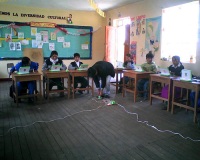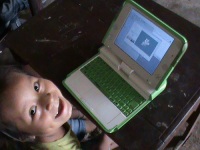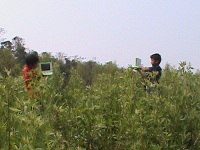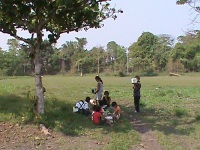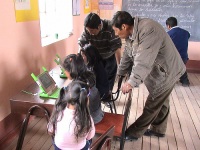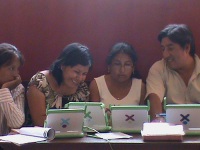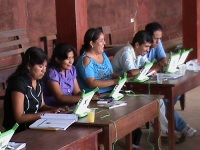I am Antje Breitkopf, a student from Germany and I spent the last 9 month in Peru, doing a field research about the OLPC project there. With the material that I have gathered I want to write my thesis to finish the studies of Education, Anthopology and Political Science at the University Hamburg, and of ePedagogy Design - Visual Knowledge Building at the AALTO University in Helsinki.
I was about 4 month in the field, meaning the villages of mainly Puno and some in Madre de Dios, visited 12 schools and interviewed teachers, institutional and other government staff such as DIGETE's Oscar Becerra and Primaria PeruEduca's webmaster Jorge Contreras.
In the schools I recorded video of the lessons, worked with the children and downloaded materials from their XO laptops. In the district of Moho, where I spent the longest period and came back to visit the schools after about 4 month, I also interviewed some parents to learn about their view of education.
There are many things that I would like to share, but here I will try to keep it short, also because I still need to analyse most of my material. I wrote a report for DIGETE and published it on the webpage of somos azucar, the local Sugar community that I collaborated with in Peru, for the ones who want to read more.
There have been many posts about the structural and technical side of the project, so I want to present a more local perspective, focusing on where the laptops are actually used, in the schools.
About the classes
I witnessed a great variety of scenarios though at this moment I will only describe some of the outstanding cases. One of the best examples was a teacher in the district of Moho, Puno who used the laptops in each lesson, either as motivation (e.g. using a game), to develop the topic (e.g. using wikipedia to introduce a topic), or in the final part extending what the children have learned (using various activities). Her children of grade 3 and 4 used the laptops with more confidence and understanding as their mates in grade 5 and 6, which really impressed me.
In a „one-teacher-school" („unidocentes" with just one teacher for all grades) in Tambopata, Madre de Dios the teacher was using „Scratch" to create a little comic with the older children, while the little ones were coloring the cat using the same activity. The laptop seems to me especially useful in these scenarios as it allows to simultaneously use different activities or give different tasks, keeping one group of children occupied while the teacher can explain to the others, and allowing to manage the different grades.
In another school in Moho, they were using the camera to film themselves while reading and could correct themselves, when they would listen and better understand their mistakes. The teacher told me it was helping a lot to develop the childrens skills, all of them were Aymara-speakers and learned Spanish as their second language. There are plenty of more examples and I plan to create a more detailed and complete collection of cases, using my video recordings and records of classroom observations. There are many photos of my school visits on Flickr.
About the students
Most of the teachers say that the children are much more confident and skilled in the use of the laptops than they are themselves. And to me it occured as well that the children were using the XOs quite naturally and intuitively. I could wittness some very interesting dynamics. In one class all the children were playing the same game, an example of the activity „Scratch", I figured one of them must have found it, experimenting, and then showed it to his friends.
In many schools the children had recorded music from radio or television and shared it with their friends, so that many had the same favorite songs on their laptops. This is how a lot of knowledge is being shared by the children, especially when it comes to games and music. I visited 5 schools where children take the laptops home regularly, some where they can take it sometimes, when they get tasks to do, and 4 where the laptops always stay in school, mostly for safety reasons. I found that it allows the children to explore much more when they take the laptops home.
Also I collected some very interesting materials, like photos and videos that show how they portray their world and to me represent a great influence in the formation of their identities. It is especially interesting to see the „self portraits" of children and I hope to find a way to analyse this phenomenon more deeply. I uploaded many of the photos taken by children on Flickr.
In general it is very important to me to let the children explore, and give detailed instructions working with concrete tasks in the right moment. Sometimes it is important to explain to each child individually and in general to let them ask questions and help each other.
About the teachers
For me, the most important factor in this project is the teacher, as he/she is the one that effectively uses the laptop in school. He/She needs to find ways to integrate it into classes, to contextualise the materials, to explain functionality and tasks to the children, and to solve all kinds of problems that may occur.
For many of the teachers that I have met this was a great challenge, especially when they haven't used computers much themselves. Some never used the internet and only use a computer to write their reports for the Ministry. So the training of teachers is a main task and challenge.
Here the project is developing and all the people involved, trainers and teachers learn a lot. In the first „capacitaciónes" (teacher training - photos on Flickr) that I have visited, they mainly explained the functions and general use of the laptops, but in later ones the focus was much more on how to use them pedagogically, how to contextualise and integrate the activities into lessons. Some of the teachers have visited a number of courses and they seemed more and more confident.
What I also find very important is communication and exchange of experience. Many people say here is where Internet is lacking most and of course I think it would really facilitate the situation, but also I realized that the people there (in the countryside of Peru) need to establish physical networks at first. There are some networks, where teachers meet regulary, but many feel all alone.
Also there are a number of webpages around the project, that offer information, materials, training courses, and as well a „community" and chats, but as I mentioned many of the teachers in abroad villages don't have the possibility, knowledge or costum of using the internet. They need examples and good materials to learn how to use the laptops in classrooms.
One of the problems I see is that none of the schoolsbooks are being digitalized, so that much of the material that I have seen in the laptops is kind of seperated from the curriculum. Many teachers mentioned this problem, or wrote it in my questionaries. Also they want more help and support from the institutions, technical problem solving and pedagogical assistance. There is a program of teacher assistance called PELA (Programa Estratégico de Logros de Aprendizaje) which attempts to include the handling of the XO laptops, by training the accompanying teachers.
I could clearly see progress in the pedagogical use depending on how long ago the laptop was introduced, how many times the teachers were trained and for how much time they were at the schools. There are a many teachers, especially in the more rural places, that are being contracted for just one year.
This creates many difficulties for students, who have to get used to a new teacher every year and mostly are less confident, as well as the teachers, because many that came to the schools just this year have not been trained and the ones that were in the school before leave to another one where the laptops may not have arrived yet, so that they don't use their knowledge. Besides these structural aspects the successful use of the laptops depends much on the interest, ability, confidence and commitment of the teacher.
